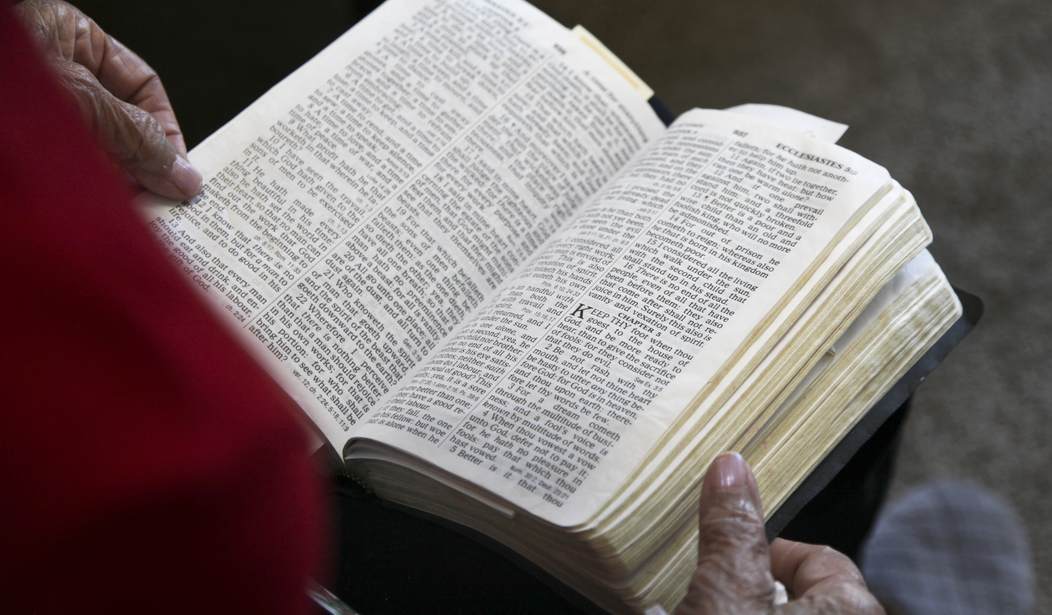Author’s Note: Interested readers can find all previous volumes of this series here. News Flash: The first 56 volumes are compiled into a book titled “Bible Study For Those Who Don’t Read The Bible.” More details at the end. Now back to our regular programming.
Thanks for joining the first Bible study of “sparkle season,” where in the commerical world — Christmas commonly known as “holiday” — means gifts, lights, parties, trees, etc. But today, and for the next three weeks, we will celebrate what is officially known as “Advent season” until the advent (arrival) of a Jewish infant named Yeshua — born of a teenaged mother named Myriam. (The name of His real Father is a bit complicated for this brief introduction, but Yeshua’s earthly father’s name was Yosef.) Then, and officially, the “Christmas season” begins at Yeshua’s birth.
For our first Advent season study, we will examine the miraculous conception and birth of John the Baptist. This story — recorded in only one of the four gospels — appears at the beginning of Luke. John’s birth is soon overshadowed by Jesus’s at the beginning of Luke chapter two. However, their Divine conceptions are intertwined and comprise the entire narrative of Luke chapter one. Then, in Luke chapter three, Jesus and John appear together as grown men for the Great Purpose of John to baptized Jesus —marking the beginning of Jesus’s earthly ministry. (See Vol. 84.)
I love John’s conception story and, when it is contrasted with Jesus’s, we learn a powerful lesson: When the Lord sends a heavenly messenger to deliver life-altering news, there is a wrong and right way to respond.
Recommended
But before we begin, note that some Bible scholars believe that Mary (a senior citizen at the time of Luke’s writing) told these conception and birth stories directly to Luke. This is a plausible concept and perhaps why intimate details concerning Mary and Elizabeth appear only in Luke’s gospel.
You might consider going back to read Vol. 39, also based on Luke chapter one titled: “Mary and Elizabeth, Both Miraculously Pregnant, Have a ‘Visitation.’ ”
What follows is a brief paraphrase of John the Baptist’s conception:
A Jewish priest named Zechariah and his wife Elizabeth were both descended from the line of Aaron, who was the first high priest and brother of Moses:
“Both of them were righteous in the sight of God, observing all the Lord’s commands and decrees blamelessly. But they were childless because Elizabeth was not able to conceive, and they were both very old” (Luke 1: 6-7).
An Ignatius Bible commentary I read offers the following explanation: “Zechariah and his wife Elizabeth represent the priesthood and the Law of the Old Covenant. Both were righteous, as the priesthood was holy and the Law was good; but together, they were unable to bear children for God or bring forth the grace of Christ. The couple thus signifies the aging Old Covenant awaiting the blessings of the New.”
Therefore a Divine intervention was needed:
As was “the custom,” Zechariah was “chosen by lot” to “go into the temple of the Lord and burn incense.” That was when “an angel of the Lord appeared to him”:
“When Zechariah saw him, he was startled and was gripped with fear. But the angel said to him: ‘Do not be afraid, Zechariah; your prayer has been heard. Your wife Elizabeth will bear you a son, and you are to call him John. He will be a joy and delight to you, and many will rejoice because of his birth, for he will be great in the sight of the Lord ’ ” (Luke 1:12-15).
Then the angel tells Zechariah more about his son’s unique life and Godly purpose:
“ ‘He is never to take wine or other fermented drink, and he will be filled with the Holy Spirit even before he is born. He will bring back many of the people of Israel to the Lord their God. And he will go on before the Lord, in the spirit and power of Elijah, to turn the hearts of the parents to their children and the disobedient to the wisdom of the righteous—to make ready a people prepared for the Lord’ ” (Luke 1:15 -17).
Next, Zechariah errored in judgment, thus, our lesson about the “wrong way to respond” when you encounter an angel bearing supernatural news:
“Zechariah asked the angel, ‘How can I be sure of this? I am an old man and my wife is well along in years ’ ” (Luke 1:18).
Cue the old record scratch sound because second-guessing an angel equates to offending God, as Zechariah quickly learns:
“The angel said to him, ‘I am Gabriel. I stand in the presence of God, and I have been sent to speak to you and to tell you this good news. And now you will be silent and not able to speak until the day this happens, because you did not believe my words, which will come true at their appointed time’ ”(Luke 1: 18-20). (Yikes! Don’t mess with Gabriel.)
Of course, Gabriel’s prophecy came true, but when the miracle baby was born, Zechariah still could not speak. All their relatives gathered around and, because of Jewish tradition, assumed that the baby would be named after his father. But Elizabeth “spoke up” and said:
“ ‘No! He is to be called John.’” Then “he [Zechariah] asked for a writing tablet, and to everyone’s astonishment he wrote, ‘His name is John.’ Immediately his mouth was opened and his tongue set free, and he began to speak, praising God” (Luke 1:57-66).
Now, let’s go back to earlier in Luke’s first chapter and examine Mary’s reaction to Gabriel’s news that “You will conceive and give birth to a son, and you are to call him Jesus” (Luke 1:26-38). Yes, Mary was perplexed:
“ ‘How will this be,’ Mary asked the angel, ‘since I am a virgin?’ ” (Luke 1:34). However, she accepted Gabriel’s message, whereas the older priest Zechariah questioned Gabriel, asking, “How can I be sure of this?” A significant difference. Gabriel also told Mary that Elizabeth was pregnant, saying:
“ ‘For with God nothing will be impossible.’ " To which Mary famously and obediently replied:
“ ‘I am the Lord’s servant,’ Mary answered. ‘May your word to me be fulfilled ’ ” (Luke 1: 34-38).
And now you know that if you are blessed to receive a message from God — either directly or indirectly — you can question it like Zechariah or trust His word and act with obedience like Mary.
In either case, you are blessed to receive a gift that no one can buy on Amazon.
Happy Advent Season!






















Join the conversation as a VIP Member